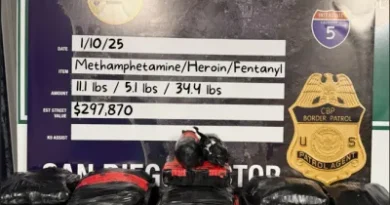Sildenafil Jelly and Pills Seized by Cincinnati CBP Over 5 Days 28,600 Pills 700 Jelly Packs Worth More Than $866K
On December 4, 5 and 9, US CBP officers seized three shipments of improperly imported Sildenafil pills and jelly transiting through the Port of Cincinnati. Officers found 28,600 pills of the prescription drugs in two shipments of pens, while the third shipment was manifested as flavored jelly. This shipment contained 700 packets of jelly laced with sildenafil, the active ingredient in Viagra.
Two shipments originated from India, while the third was arriving from Singapore. One of the shipments from India contained 1,860 packets of 10 Sildenafil Citrate tablets, for a total of 18,600 pills. This shipment was heading to a residence in Snellville, Georgia. Had they been legally sold the pills would have been worth over $561,000.
The other two shipments, originating from Singapore and India, were heading to the same address in Macomb, Illinois. The shipment from Singapore 700 jelly packets while the other shipment from India contained 10,000 Sildenafil pills. Had they been legally sold, the pills and jelly would have been worth over $305,000.
The Food and Drug Administration (FDA) works with CBP to protect consumers from products marketed as dietary supplements that contain any hidden drug ingredients. Because only three percent of online pharmacies reviewed by the National Association of Boards of Pharmacy are in compliance with U.S. pharmacy laws and practice standards, purchasing drugs online is risky not only for the consumer’s health, but also their wallet.
“Our highly-skilled officers continue to focus on our mission to protect our country and its citizens,” said LaFonda D. Sutton-Burke, Director, Field Operations-Chicago Field Office. “CBP works closely with the FDA and other partner agencies to effect this mission and make sure controlled substances with unknown additives or inferior standards do not make their way into American households.”
E-commerce trade has soared throughout the pandemic, expanding foreign sellers’ market access to the United States. However, these sellers may not have all pertinent information to comply with U.S. admissibility laws, and drugs made in foreign facilities may lack necessary oversight and good manufacturing practices ensuring patient safety. Prescription drugs sold in the U.S. must conform to the FDA’s high standards, protecting consumers from dangerous irregularities in drug potency.
“Protecting our citizens from inferior products with unknown ingredients is a priority for our officers and specialists,” said Richard Gillespie, Port Director, Cincinnati. “CBP is entrusted with enforcing hundreds of laws for other government agencies, and our inter-agency partnerships are critical to ensuring the safety of the American people.”




